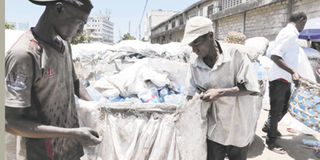The heroes of Dar es Salaam: The trash bearers

Salum Hassan (C) and colleagues assemble the trash for sale. From the informal recycling station in Kariakoo the owner transports the collected plastic to a Chinese company which then exports the recycled plastic to the Chinese market.
PHOTO | ANNE KIDMOSE JENSEN
What you need to know:
Salum Hassan wakes up at five in the morning to collect trash. He leaves his home in Mbagala before sunrise and walks towards Dar es Salaam’s city centre as he picks up plastic bottles and nylon plastic on his way. He stuffs the plastic into the white polysack that he carries on his back. When it is filled with plastic he walks with it to an informal recycling station where he is paid according to how heavy it is.
Dar es Salaam is both among the fastest growing and the dirtiest cities in the world, and it produces thousands of tonnes of waste every day. Informal waste pickers relieve the city of plastic trash and carry the leftovers of a booming city on their backs.
Salum Hassan wakes up at five in the morning to collect trash. He leaves his home in Mbagala before sunrise and walks towards Dar es Salaam’s city centre as he picks up plastic bottles and nylon plastic on his way. He stuffs the plastic into the white polysack that he carries on his back. When it is filled with plastic he walks with it to an informal recycling station where he is paid according to how heavy it is.
He has just arrived at such a recycling station on the outskirts of Kariakoo. He hangs the bag full of plastic bottles on a hook and inspects the weight attached to it. Eight kilogrammes. That will give him 800 shillings – 100 shillings for every kilo of plastic bottles. Before he goes into to the streets again in the search for plastic, he seeks refuge from the midday sun under a parasol surrounded by large polysacks with plastic. They stand around him like walls in a house. The air in between the sacks is heavy with heat, and flies swarm around the plastic bottles and leave a sticky sensation on the skin.
“I am doing this job because I don’t have any other options. I wish that one day I’ll get a proper job, have a nice place to stay in and live a decent life,” Salum Hassan says. He is 35-year-old and he has been living off collecting plastic for five years.
He walks long distances every day with the polysack on his back and reaches home around sunset. As he picks up plastic in the streets he is often met with harsh comments and told to leave the streets and the plastic in place.
“People chase me away and tell me that I should not collect the bottles. People see us as a disturbance. When that happens I just decide to leave and go somewhere else to collect bottles,” Salum Hassan says.
Dar es Salaam has been rated among the dirtiest cities in the world several times. Forbes magazine ranked the city as the world’s 12th dirtiest in 2008. Currently, Dar es Salaam is experiencing a steady growth as new inhabitants arrive. A report published by the African Development Bank from 2014 finds Dar es Salaam the fastest growing city on the continent. Its population is expected to grow by more than 85 per cent, from around 3,3 million people in 2010 to 6,2 million in 2025.
Matthew Haden, director of The Recycler, a company which recycles waste from companies and organisations in Dar es Salaam, finds that the city’s informal waste pickers constitutes a valuable resource to the city.
“They are the real heroes of Dar es Salaam,” he says. According to him the waste pickers are not only serving their own households with the money they make from selling waste, but also the general society.
“They are doing a massive service to Dar es Salaam and they are saving the municipalities a lot of money. By every kilogramme of plastic bottles they divert from going to the landfill, they spare the municipalities for constructing more landfills,” Mr Haden says.
The same point is made in a study from 2015 by the waste management consultant Joshua Palfreman based in South Africa. He has researched extensively on Dar es Salaam’s waste management. He finds that “the informal network of waste pickers and informal recycling transfer stations in Dar es Salaam is providing a commendable environmental and waste management to the city.” He concludes that there is a great potential for developing the work of the informal waste pickers.
Every day Dar es Salaam produces around 4,260 tonnes of waste and only 30 per cent is dumped in the city’s landfill in Pugu Kinyamwezi, according to the study by Mr Palfreman. He estimates that 70 per cent of the city’s waste ends in waterways, in fields, in the flames of a fire, or in Dar es Salaam’s informal waste collection.
Mr Palfreman estimates that there are 1,267 waste pickers in Dar es Salaam who collect waste and carry it to a transfer station where they sell it to a middle man. The middle man sells it onward to a company that recycles the plastic and exports it to the international market. At the informal recycling station in Kariakoo, Ramadhani Idi Kisigalile, who has been trading with waste for six years, says that most of the plastic is exported to industries in China and used in production of clothes, shoes and plastic slippers.
From the informal recycling station in Kariakoo the owner transports the collected plastic to a Chinese company which then exports the recycled plastic to the Chinese market. The Chinese company pays 200 shillings for a kilo of plastic bottles and 400 shillings for nylon wrap plastic.
Among the plastic that is torn into bits and pieces for recycling, are the bottles that Salum Hassan collects in the streets. On a regular day he walks several rounds in Kariakoo and the city centre, sells his collected plastic at recycling stations and walks out in the busy streets again. If he has a good day he can make 10,000 shillings, if he is less lucky he makes around 8,000.
“My wife works as a house help, so whatever we earn has to be enough. We have two children, one in primary school and one in nursery school. And if I don’t have enough for my family, my wife helps me,” he says.
Next to Salum Hassan sits Ramadhani Mohamed, 40, on a stuffed polysack under the multi-coloured parasol. He would like to use gloves and boots to make his work safer, he explains, but his feet are bare in plastic slippers. He has just handed in nine kilos of plastic bottles which he collected in the morning hours along the streets of the areas Upanga, Posta and Kariakoo. He took the bus from his home in Buguruni at five o’clock in the morning to the central parts of the city.
“Before collecting plastic I made a living from small businesses. I sold cigarettes and karanga (groundnuts) in the streets, but things didn’t go well,” he says.
He chose to collect plastic because he had nothing else to do, but the working conditions are tough and he does not feel appreciated. Often people suspect him of being a thief since some of the waste pickers are, he explains. He is met with a cold glance or told to stay away.
“I walk a long distance every day, the sun is very strong and people look down on us who pick waste. But it has to satisfy me, because I have no other way,” Ramadhani Mohamed says.




